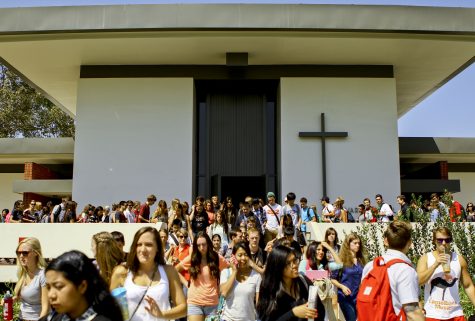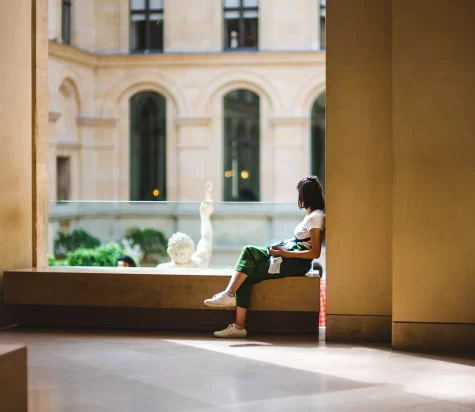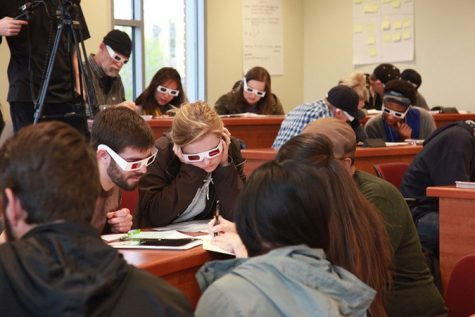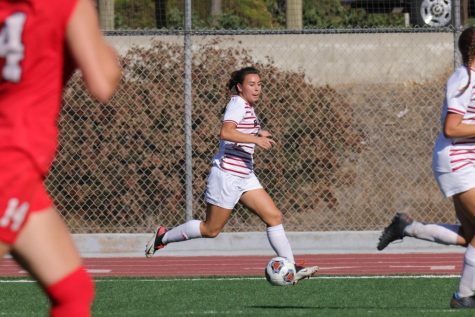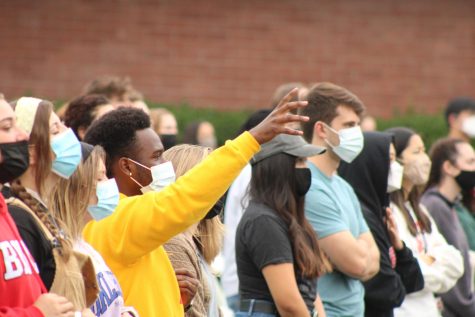Aftershocks continue to rock Japan, citizens scared
Hitomi Morimoto hasn’t been outside her house since the earthquake hit March 11 because of the threat of radiation, and says she feels like she is in a war.
March 23, 2011
Hitomi Morimoto hasn’t been outside her Tokyo home since the magnitude 9.0 earthquake rocked the country March 11, so far leaving 21,000 dead or missing, and 250,000 refugees.
As aftershocks, some as high as magnitude 6.6, continue on a daily basis, life even in the industrialized city of Tokyo feels primitive. With rolling blackouts, silent alarms warning of coming earthquakes, and the ominous threat of nuclear radiation in the atmosphere, Morimoto, 22, is scared. She said she feels like she is in a war.
An unforeseen afternoon
Morimoto, a communications major at Tsuda College, a Christian university, was home alone the afternoon of March 11 finishing up some research before heading to a job interview. As she sat at her desk typing on the computer, she was unaware that she actually wouldn’t go outside and catch the train as planned. In fact, she would never make it to her interview.
Earthquakes are commonplace in Japan, an accepted part of life in a country that resides on the geologically active Pacific Ring of Fire, where the Pacific Plate is moving at a rate of 3.5 inches a year. The shaking ground barely interrupts the activities of daily life. But this was no ordinary quake.
“I felt a vertical shake which I’ve never experienced in my whole life, living in this earthquake country,” Morimoto said. “I felt something different, so I rushed to the bookshelf in my room and I tried to hold it.”
The vertical shake Morimoto felt was the jolt of a tectonic plate giving way and suddenly sliding beneath another, causing several feet of Japan’s eastern shoreline to collapse. The intense tremor lasted for several minutes. Bookshelves and cabinets fell over in every room of the house, spilling knick-knacks and books everywhere. Glass dishes and bottles shattered in the kitchen, creating a dangerous mess all over the floor. The upright piano slid across the room by itself.
“I remember I was talking to God and half crying and everything,” she recalled. “I didn’t know when it was going to stop. I was really scared.”
Within 10 minutes of the quake, friends in America were texting Morimoto to see if she was safe. She was unhurt, but alone and scared. The shaking continued for another 30 minutes.
“I was in panic,” Morimoto said. “I couldn’t think of anything. But after the earthquake calmed down, the first thing on my mind was my family who was outside.”
Missing family
With the phone network immediately flooded, and the phone company only allowing emergency calls, Morimoto was not able to reach her dad, mom or brother that day. So she cleaned up the broken glass and tried to repair the wreckage of their home. None of her family returned home because trains in the city had stopped running, so she went to bed alone that night.
“I didn’t know if they were safe or anything,” she said. “I was so worried, I couldn’t sleep that night.”
Alarms, aftershocks, and cracks in the walls
Morimoto was reunited with her family the next day, but life is different for them in the aftermath of the unforeseen disaster. News of the earthquake, the fourth largest on record since 1900, dominated every channel on television sets that were perpetually turned on. Silent alarms often disrupted the programming to warn of oncoming aftershocks, in tandem with alerts from the Apple earthquake app on Morimoto’s iPhone. At best, these warnings leave only a few seconds’ lead time before the ground begins shaking again. When it does, Morimoto runs to hold the furniture, or retreats under her desk. Seven earthquakes above a 6.0 magnitude have occurred in the past week alone, and smaller ones occur constantly.
The walls of the family’s home have been cracked ever since a particularly large aftershock several days after the Tohoku quake.
“I’m really scared that when the next big earthquake comes, maybe our house has no more tolerance for shaking,” Morimoto said.
Making sacrifices
With nuclear reactors in the Fukushima Dai-ichi power plant damaged, Morimoto and her family joined the rest of Japanese citizens in conserving electricity. They don’t use heaters, though it is winter, and they try to keep the lights off as much as possible. The area has been split into five sectors and rolling blackouts have been instituted. They receive a day’s advance notice when the power will be switched off, but sometimes less if too much electricity has been used that day.
Tokyo is cold, but it is even colder in northern Japan, where evacuees experience below-freezing temperatures overnight. People lack food, water and heat. The elderly –– already at greater health risks –– are unable to locate necessary medication. Fuel is in short supply, which means the thousands of bodies cannot be cremated as they should according to Japanese law. Families of the deceased have made the unprecedented move to begin burying their loved ones.
Radiation risks
Many people are afraid to go to impacted areas because of the higher risk of radiation, Morimoto said. Radiation from the damaged plant reached Tokyo within four days of the quake, measured at levels eight to 10 times higher than normal, but not deemed dangerous to people’s health.
“Because radiation has reached Tokyo, I can’t go outside,” she said. “I mean, they say it’s safe, but I don’t know,” Morimoto said, sharing her fear that the Japanese government doesn’t tell them everything they know. Officials announced Wednesday that radioactive iodine had infected Tokyo’s tap water at levels too dangerous for babies to drink, but not yet harmful to adults. They also announced that above-safety radiation levels were identified in 11 types of vegetables, causing the U.S. Food and Drug Administration to officially halt all imports from four Japanese prefectures.
These discoveries, along with the widespread evacuations of many American citizens from the area, don’t help to relieve Morimoto’s fears.
“This does not represent all Japanese citizens, but for myself, I am really scared,” she said. “If I could, I would go to a foreign country, but I only have my home here in Tokyo. So, I can’t go anywhere. I want to go.”
Biola grad runs towards the disaster
But as people scrambled to leave the country and distance themselves from dangerous areas, Biola graduate Michelle Brown headed towards the disaster instead of away from it. Brown, a 2010 alumna of the intercultural studies program, who has been teaching junior high in central Japan, decided to volunteer her two-week spring break to do anything she could to help.
“I’m about 500 percent sure I’ll be totally fine,” Brown wrote on her blog March 18, saying she was “full of assurances” that heading towards the earthquake zone was the right thing to do. Brown ended up at the northern Tokyo offices for the non-profit CRASH –– Christian Relief, Assistance, Support and Hope –– where she was put to work in the volunteer coordination department within five minutes of arriving.
Brown is helping organize and support teams who daily take supplies into Sendai, a town only 80 miles west of the earthquake epicenter. She is looking forward to her opportunity to personally go on one of the supply trips. CRASH relief workers have brought back stories of hope from amidst the devastation, such as the 80-year-old grandmother and grandson who were pulled from the rubble of their home after 10 days of being trapped next to their refrigerator.
“My fear is that the world will forget,” Brown wrote on her blog March 22. “Forget the 21,000 dead or missing. Forget the 250,000 evacuees. Forget the devastation that has befallen this nation.”
Evaluating the global response
The global response to Japan’s tragedy has been revealing.
“Four days after the Haiti quake, there were 120 million dollars donated,” Brown said. “Four days after Japan, there were only 5 million donated.”
Andrea Morimoto, a fifth year psychology major at Biola, said she has been pondering this problem. “Japan is such a modernized culture and they’re so independent that not many people think they need help,” she said. “They think they had an earthquake and they’ll be able to bounce back quickly. So we weren’t quick on our feet to respond.”
Opportunities for the harvest
Andrea is co-leading a trip to a northern island of Japan with junior Alexandria Williamson through Biola’s Student Missionary Union this summer, and they are going forward with their plans to minister on the Hokkaido University campus, despite the recent tragedy.
“The people in Japan are broken right now because of everything that is happening and they will be more open to receiving the gospel,” Morimoto said. “It’s not just a call to wake up the Japanese people, but it’s also a call to wake up the world and say that Japan needs us; Japan needs God as well.”
Andrea Morimoto, along with many others, is confident that God is present in this disaster, and is opening up opportunities through it.
“I think it will be such a huge blessing in terms of mission work because people all over the world are going to hear about this and their hearts are going to be broken for Japan,” Andrea said. “They’re finally going to go to Japan. Japan’s finally going to see the workers they’ve been needing.”


